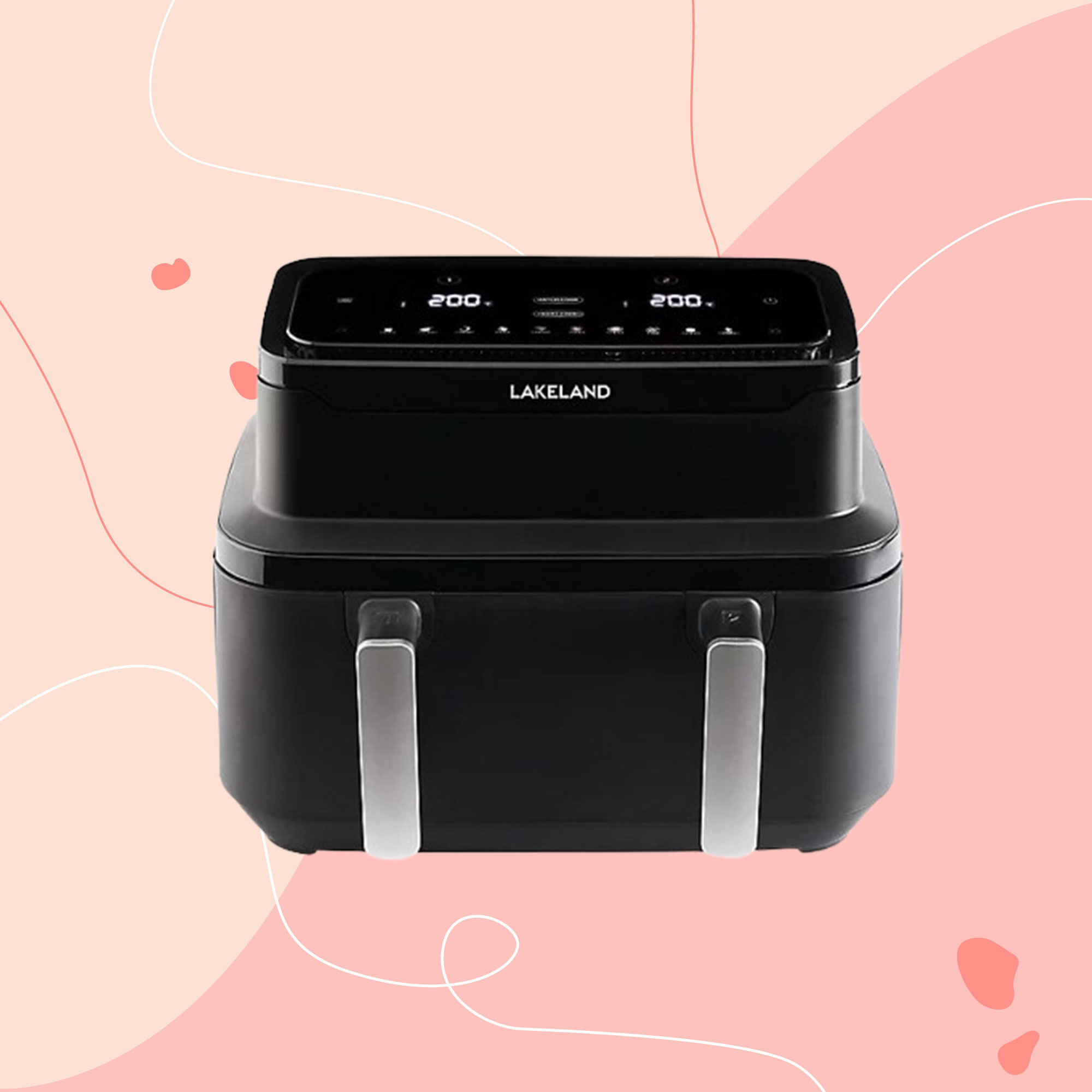
In the last year we’ve seen two of the biggest air fryer brands release innovative flexible air fryers. These models feature one large cooking zone that can be divided into two separate zones as needed. They’re some of the best air fryers around, so it’s no surprise that we’re starting to see other brands launch this style of air fryer.
I’ve previously reviewed both the Ninja FlexDrawer and the Instant VersaZone and they were both top performers. The Lakeland version is most similar to the Instant Versazone in both design and price. But notable differences include the 10 preset cooking functions.
So, to see if the Lakeland Adjustable air fryer has got what it takes to rival the big brands, I set it up in my own kitchen. Given that it’s price and size is similar to the Instant VersaZone, I wanted to know if it’s as good.
Lakeland Adjustable Large Drawer air fryer product specs
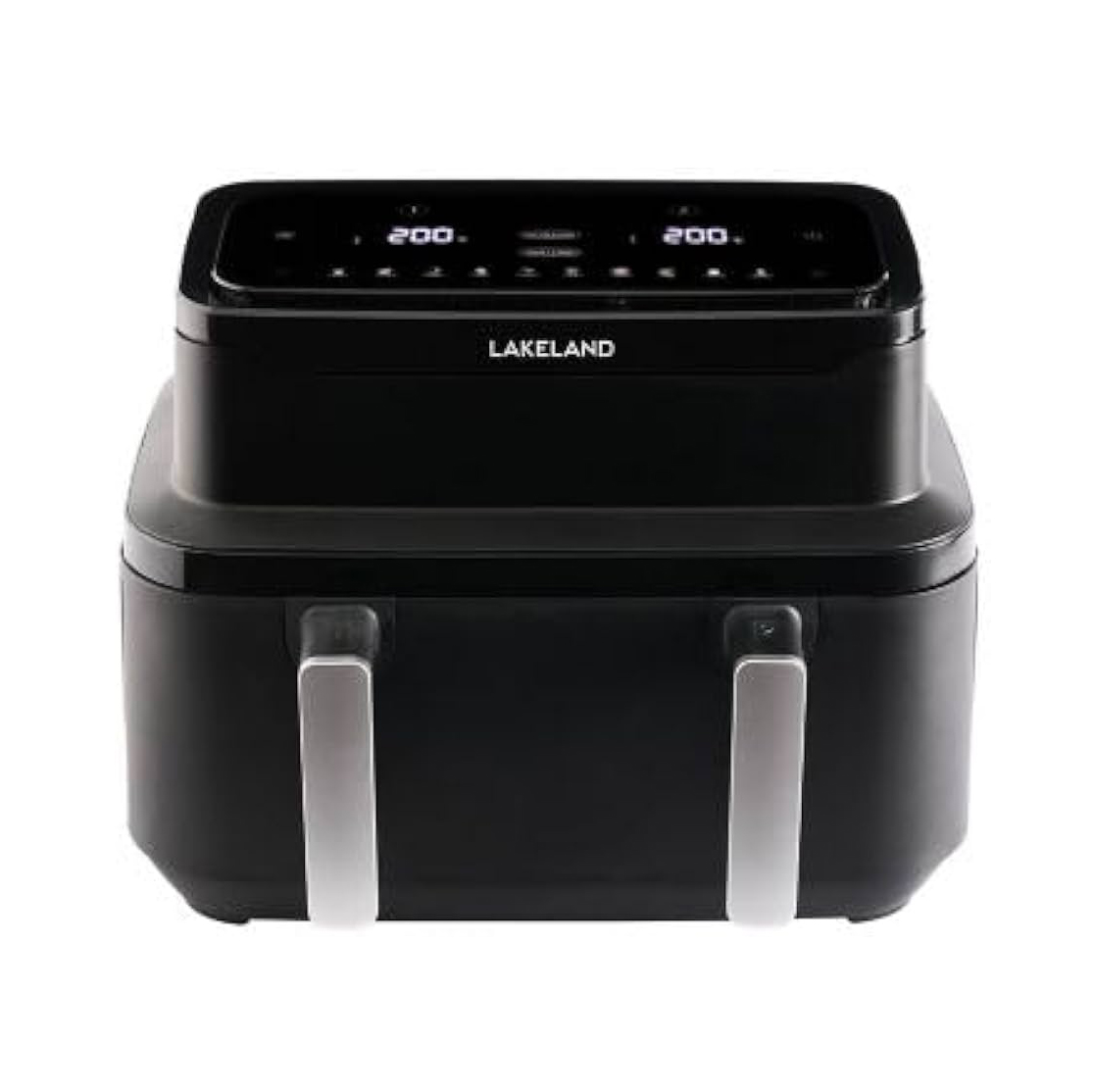
- Capacity: 9 litre (or two 4.2 litre)
- Presets: Fries, chicken, shrimp, bake, pizza, steak, fish, dehydrate, reheat
- Weight: 7.2kg
- Size: (H)31 x (W) 40 x (D)34cm
- RRP: £149.99
Unboxing and first impressions
When I first removed this air fryer from the box, I was pleased that despite its generous 9 litre capacity, it sat comfortably on my available stretch of worktop. The top third of the air fryer is kind of shrunk in comparison to the base. And I think this design is why it doesn’t look too big or imposing.
The drawer has two handles, despite this it can only be removed as one large drawer. When I first removed it, it was really stiff and I had to push my thumbs hard into the air fryer while I pulled on the handles. It also requires force to get it back into position. I’m hoping this is something that’ll ease with use and I’ll let you know later in the review.
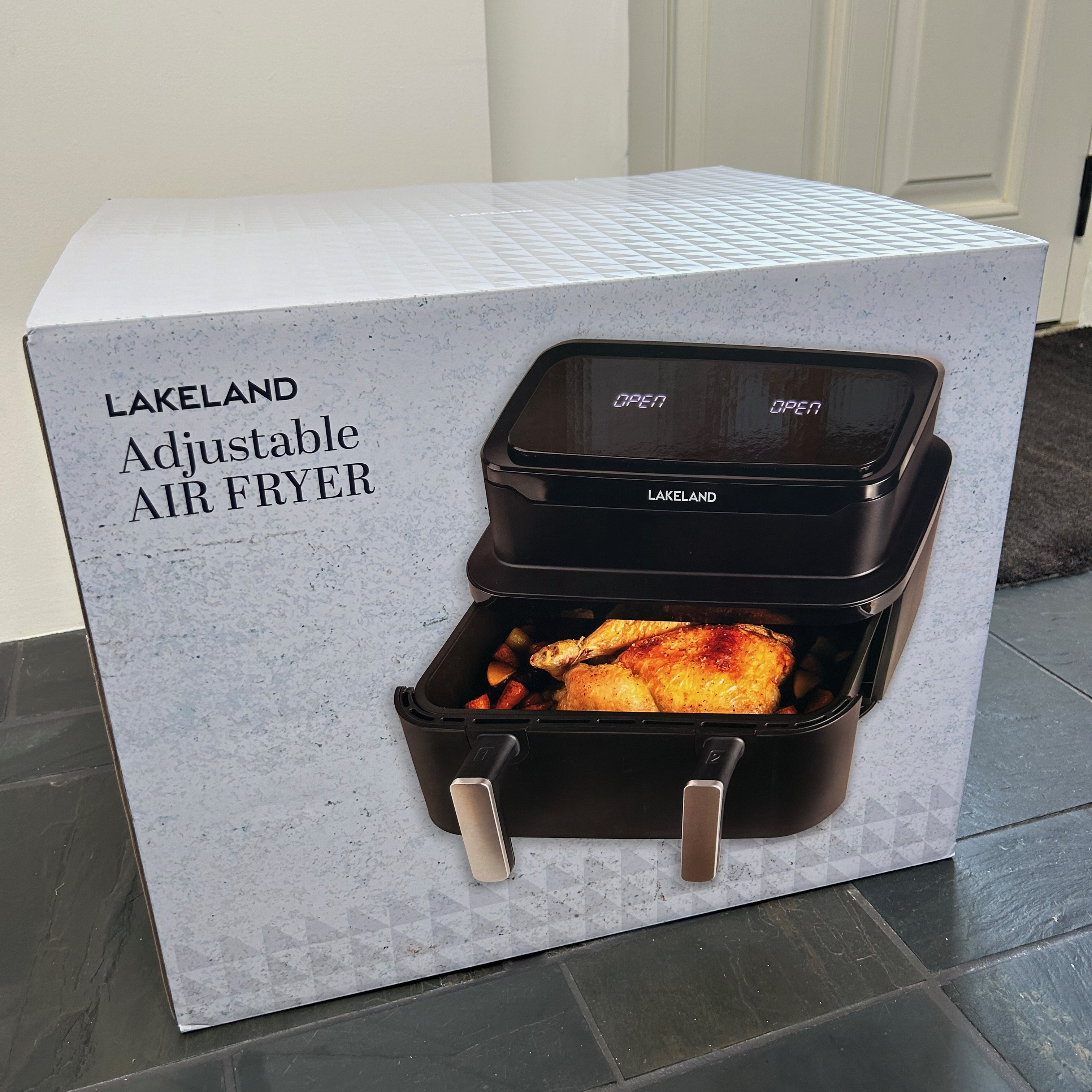
Inside the drawer there’s one large perforated crisper plate in the base. When you want to use it as two separate cooking zones a small divider section slots into a groove down the middle of the drawer. The divider is flimsy and the groove it slots into isn't very pronounced, so it doesn’t sit as securely in place as I’d like.
When the divider is in position there are obvious gaps that will allow air to pass between the zones. So it’s probably not going to be ideal if you want to use extremely different temperatures in the two sides simultaneously. That said, I can’t really see many scenarios when you’d need to do that, so it shouldn’t pose too much of a problem.
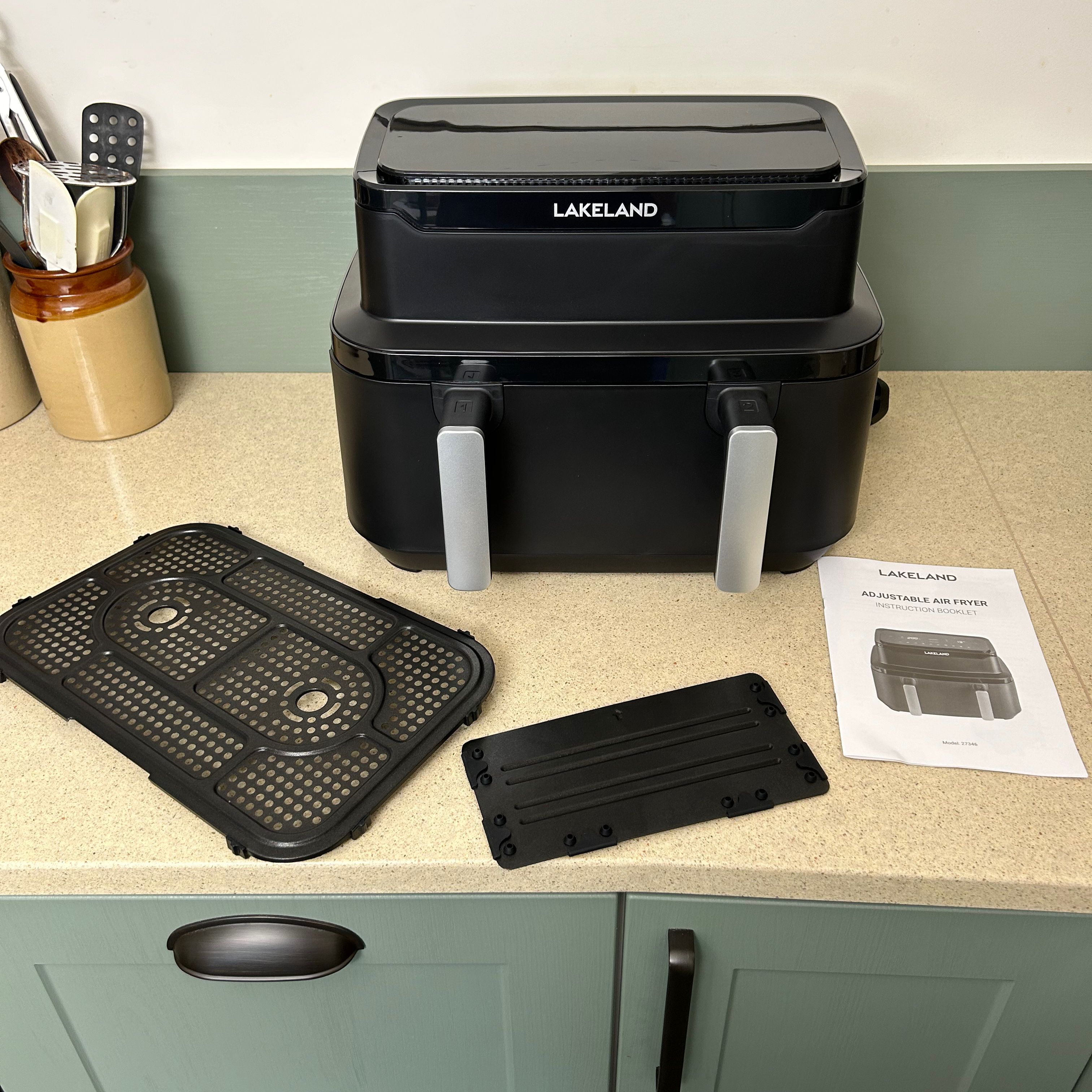
The touch control panel is on the top. It is very slightly angled to make it easier to use, but as I started to play around with the controls, I noticed I was unconsciously going on to tip-toes to get the best view. For context I’m 5ft 3in, so if you’re shorter than me, it could be a problem.
The controls are straightforward enough to use. Simply press button 1 or button 2, followed by the time/ temp button to adjust the settings for each side. Or, if using it as one zone, set side one and then select ‘match cook’ to repeat the settings on the second side, then the whole drawer will cook as one.
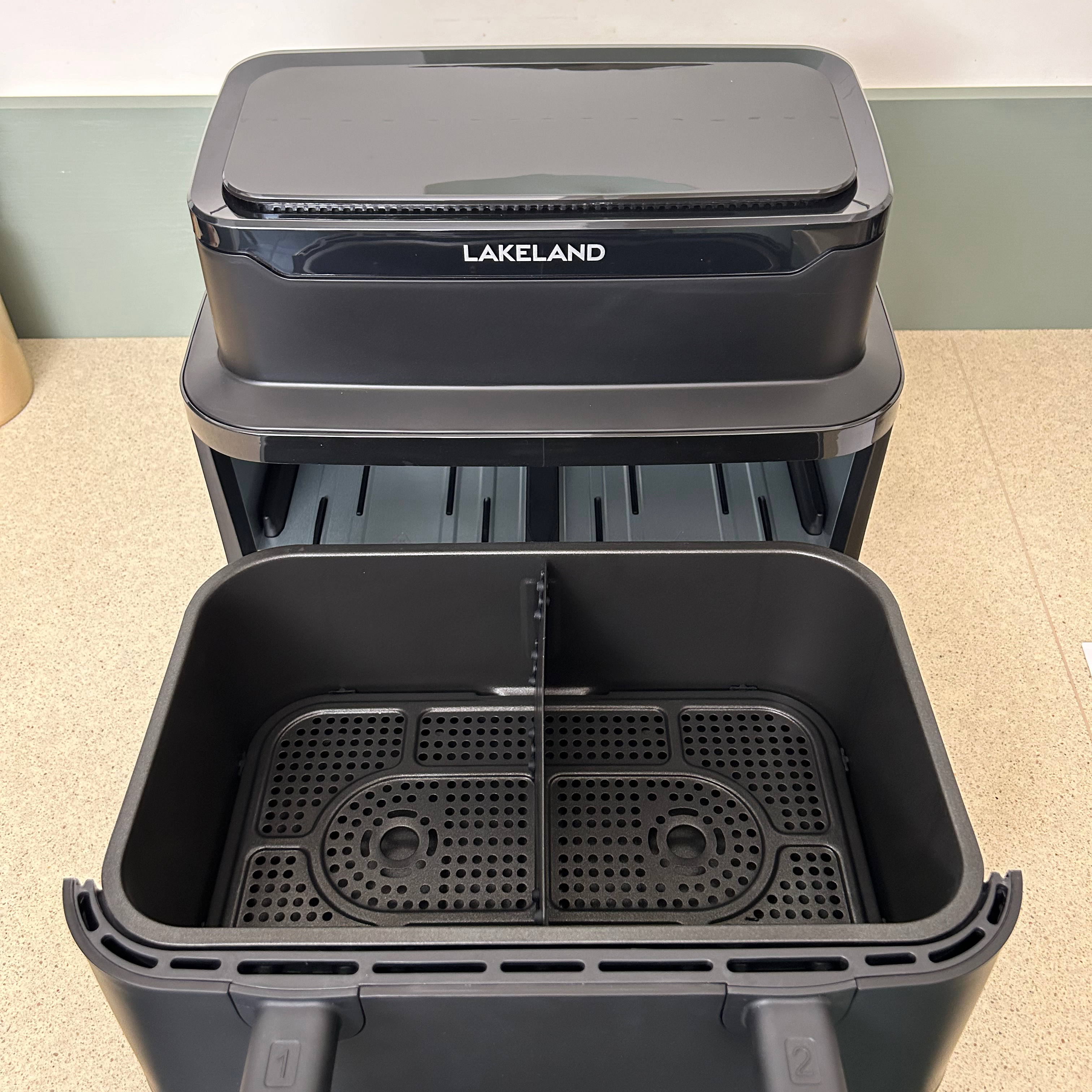
There are a series of preset cooking functions along the bottom of the control panel. And once I’d discovered that the images don’t double as touch control buttons, it was easy to select them using the arrow buttons to either side.
I looked in the manual for details on the preset functions and discovered that apart from dehydrate and reheat, they all cook at 200C and it’s just the preset time that varies. This feels like a bit of a con to me, I can’t see the point of cluttering the control panel with so many presets that are all virtually the same, other than the time.
The manual provides some basic cooking times for meat and chips as well as three different recipes. And the presets are all adjustable between 80C and 200C, the timer can be adjusted in 1 minute increments up to 60 minutes.
What is it like to use?
One of the first things I cooked was frozen breadcrumbed fish fillets. I made use of the fish preset which defaults to 20 minutes at 200C. I removed the divider which allowed plenty of space for my two awkwardly shaped fillets.
To use it as a single zone without the divider, there’s not a simple button to press, nor does it automatically detect that the divider has been removed. Instead you have to set up zone 1 and press ‘match cook’ so that zone 2 is cooking with the same settings. It’ll then function as one big zone. But this is a clunkier setup than I experienced when reviewing the comparable models from Instant and Ninja.
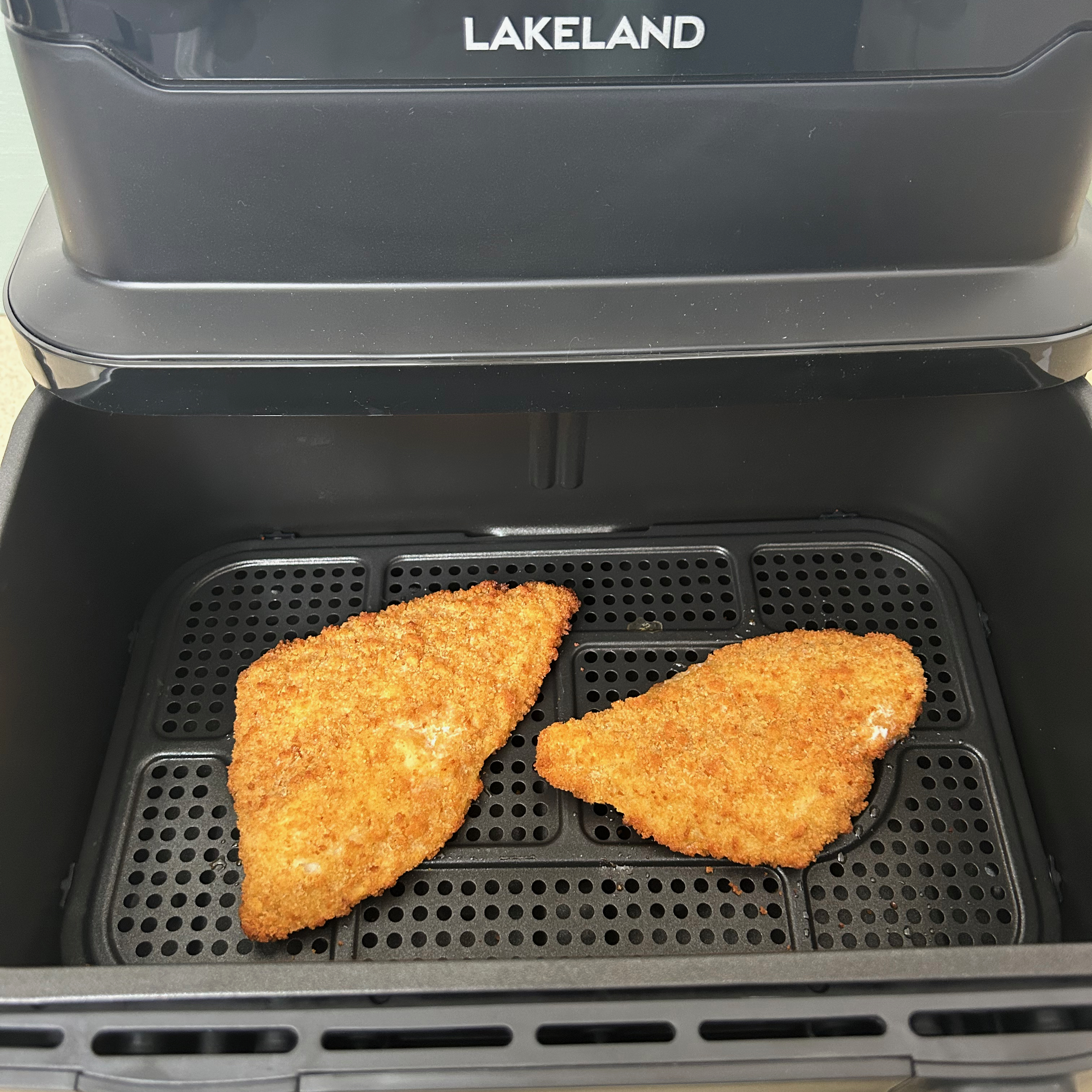
There’s no auto preheat function, so I popped the fish straight in and pressed start. About two thirds of the way through the cook time, there’s a shake reminder. So at this point I turned the fish fillets. And I ended up removing them after 18 minutes, because they were cooked through with a beautifully crunchy breadcrumb coating.
It’s worth pointing out that I found this air fryer to be quite noisy. It registered at 69dB on my noise meter, which probably doesn’t mean a lot. But it's safe to say it’s noticeably louder than my usual air fryer and many others that I’ve recently reviewed.
The large single zone mode was also useful for air frying a medley of vegetables. It allowed plenty of space for my pepper, onion, and mushroom mixture to get evenly browned and roasted. I cooked the vegetables at 190C and they developed a perfectly roasted texture in just 15 minutes. They were beautiful with warm goats cheese in a salad.

The thing about the upward facing control panel that started to get on my nerves during the time I was reviewing this air fryer, was that its position means I can’t see the timer from the other side of the kitchen. I have to keep returning to it, to check how long is left, which is frustrating.
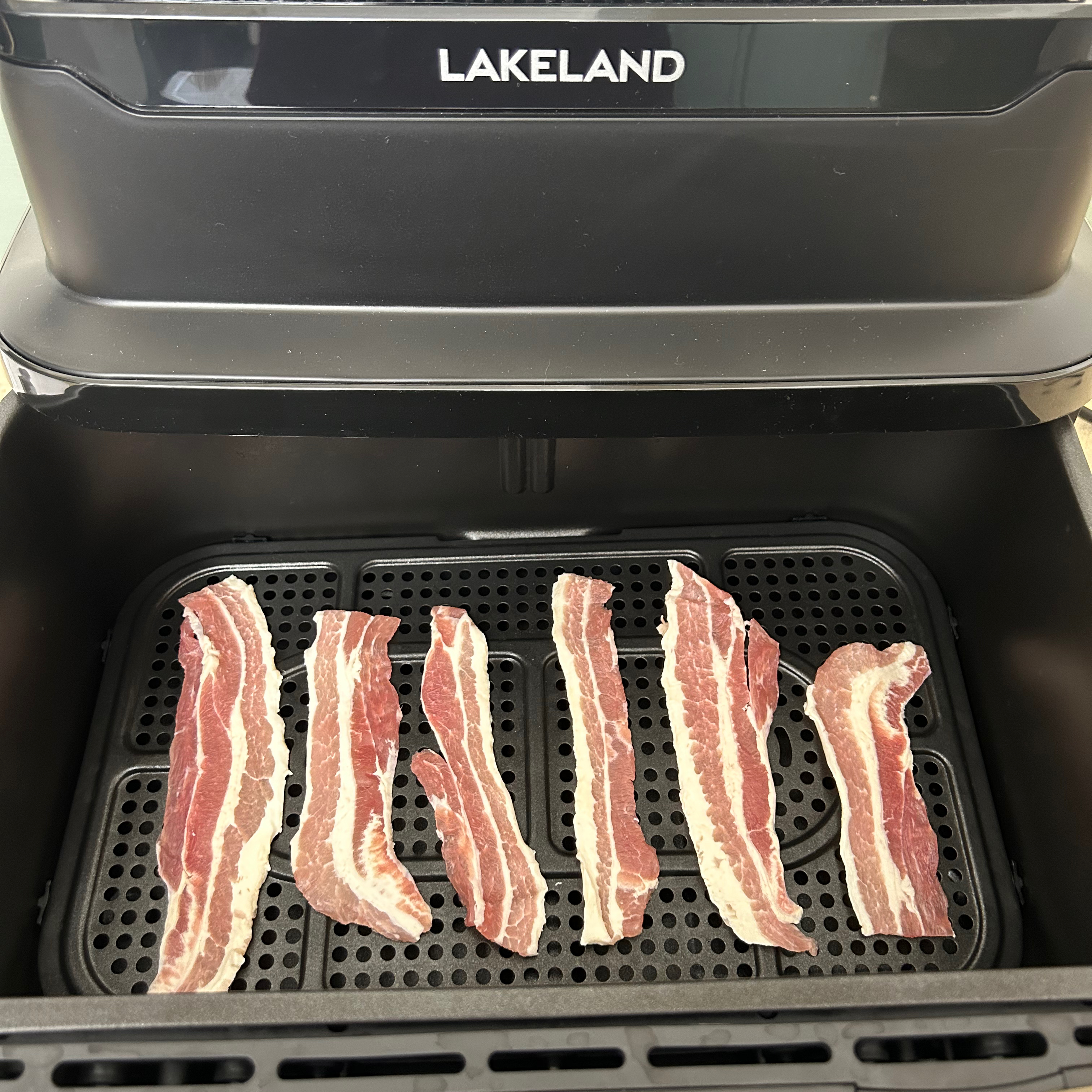
Bacon was next on the menu and I opted for the single zone mode again so that I could space the rashers out nicely. I used the bacon preset, this cooks at 200C for 7 minutes. The settings were perfect and the bacon came out with rendered fat that was crisp, but not over cooked.
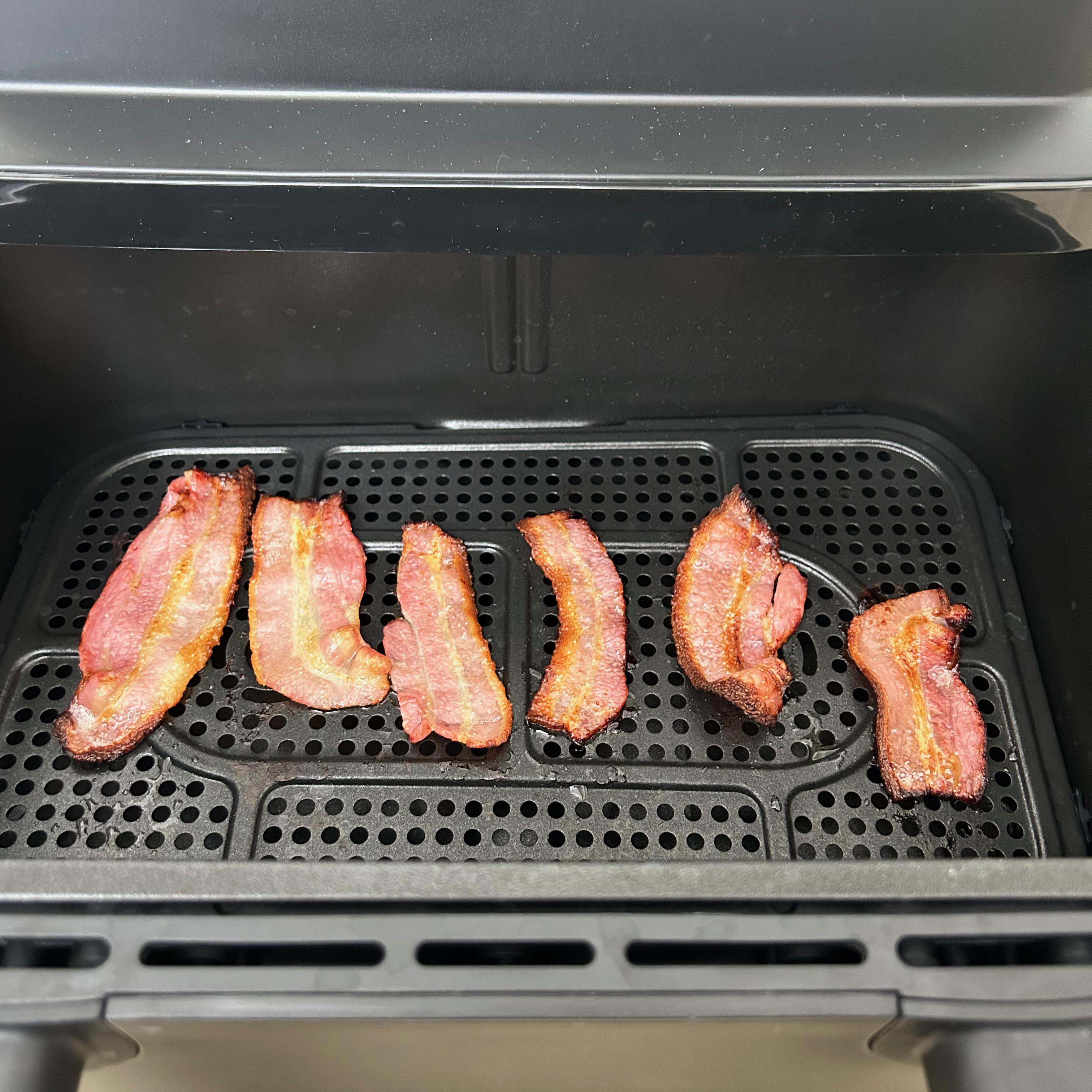
To try out the two zones cooking simultaneously, I cooked up some homemade chips alongside frozen vegetarian chicken style nuggets. Following the tips in the instruction manual I gave my freshly cut chips a good wash and a dry before lightly coating in oil.
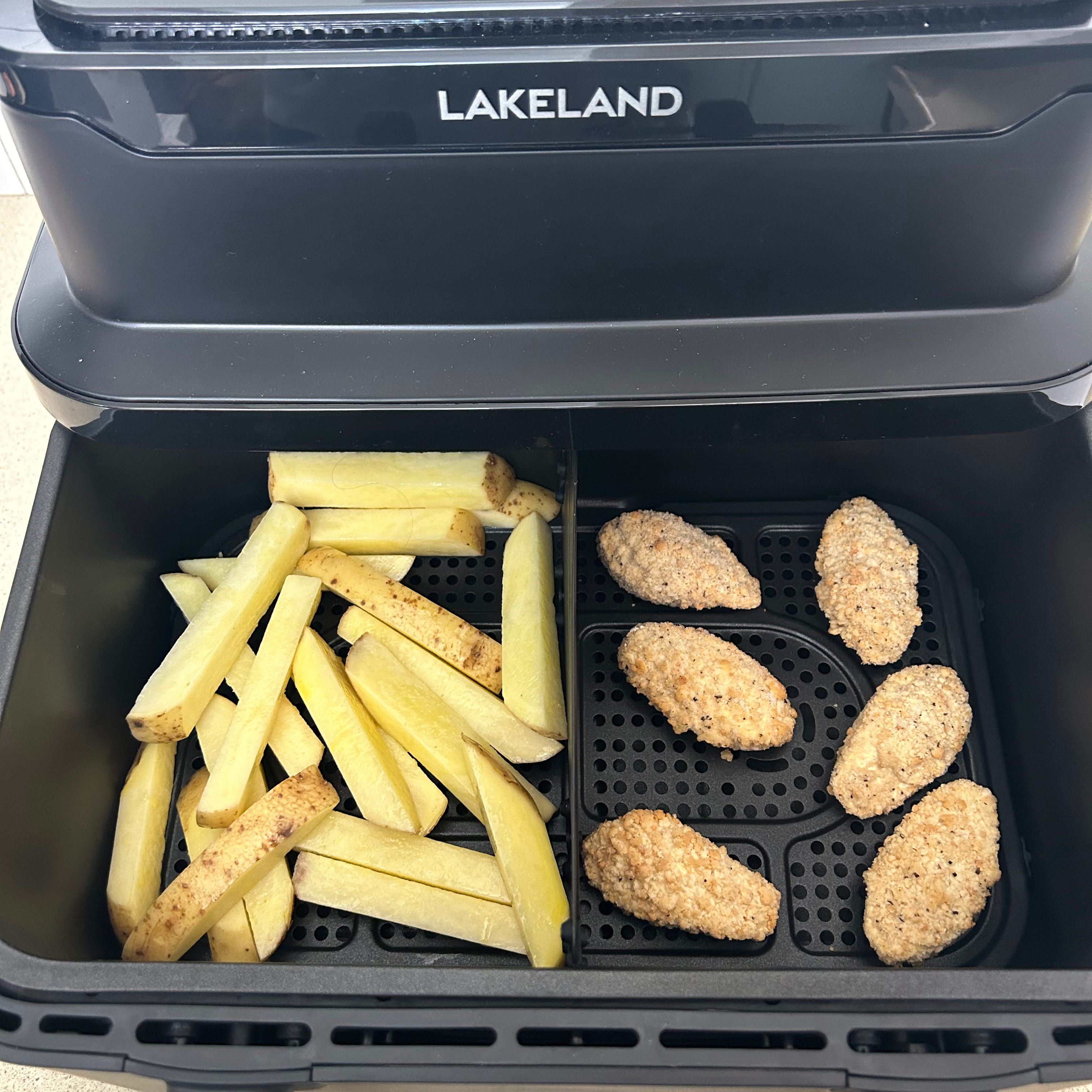
With the divider in place, I added the chips to one side and selected the ‘fries’ preset. In the neighbouring cooking zone, I popped in six nuggets and set the timer for 10 minutes. This is where the ‘smart finish’ button comes in handy. It ensures that despite the difference in cooking times, the two sides will finish cooking simultaneously.
As I mentioned earlier in the review, the divider doesn’t provide a tight seal between the two zones. Since the chips were cooking for 10 minutes before the nuggets, this was a good way for me to check if the hot air from the chips had made its way through to defrost or even start cooking the frozen nuggets too early.
Just before the nuggets were due to start cooking, I opened the air fryer and checked them. The breadcrumb coating had started to defrost, but they were still frozen solid. So despite being a tad flimsy, the divider seems like it's up to the job.
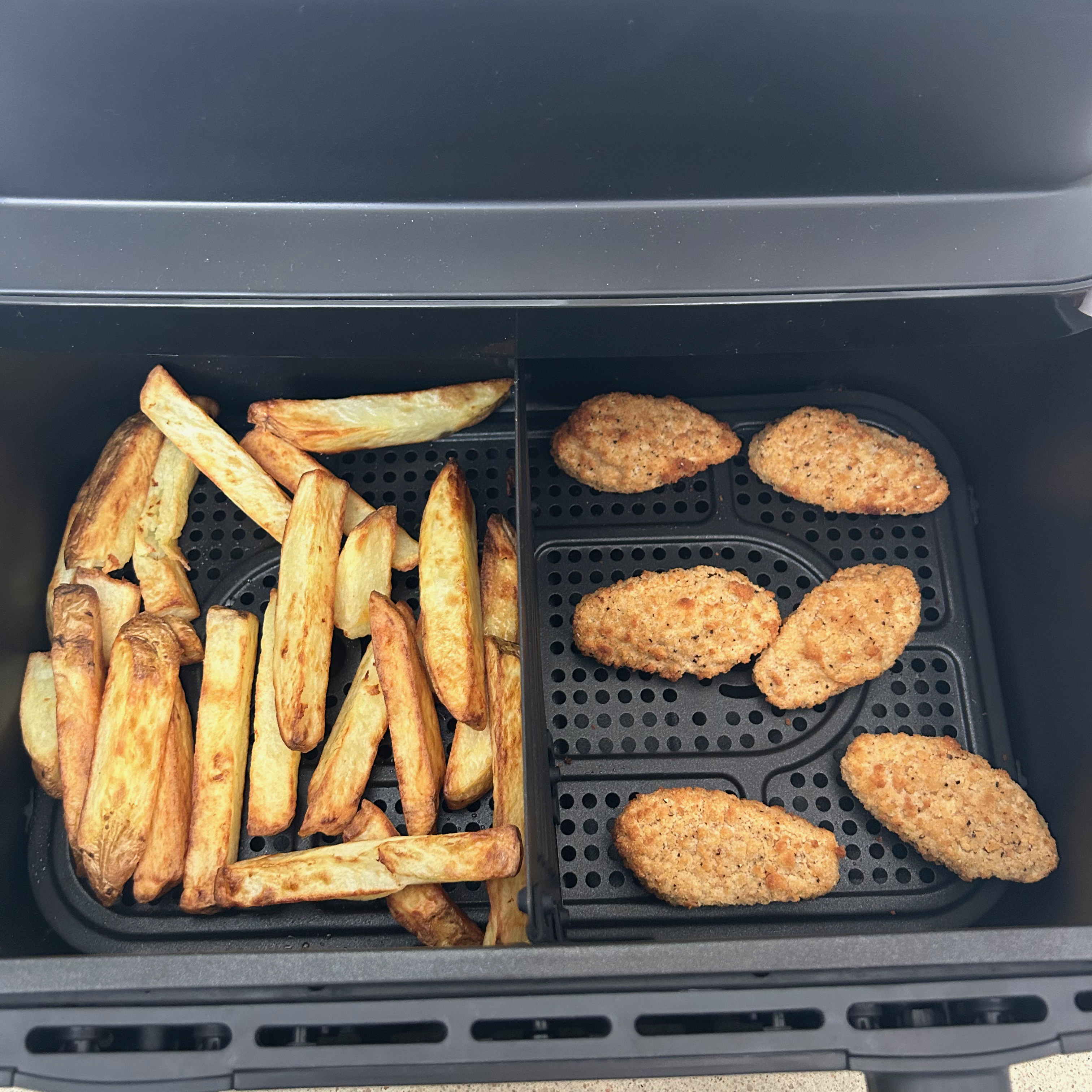
In the end I added five extra minutes to both the chips and the nuggets. The result was great, pleasingly crunchy nuggets and crisp, golden chips. The ‘smart finish’ function did its job and everything was ready to plate up at the same time.
Jacket potatoes were another success. I microwaved four small potatoes until soft, then coated them in oil and salt. After just 20 minutes at 200C, the skins were crisp and delicious.

I tried out the bake preset a couple of times, thankfully the temperature is adjustable because there are very few things I’d want to bake at 200C in an air fryer. I decided on an ambitious banana and chocolate chip loaf cake.
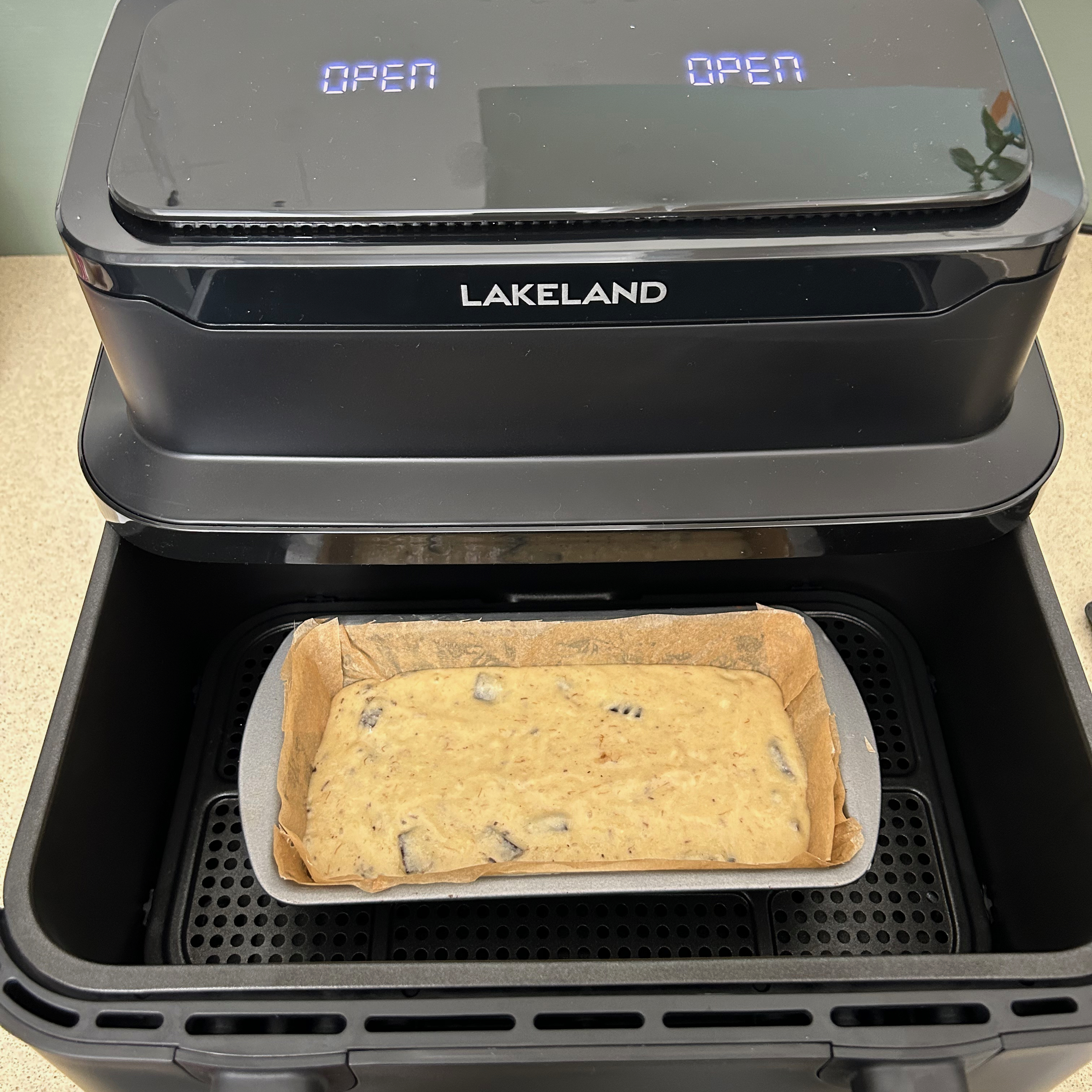
My loaf tin fit perfectly into the air fryer, though for interest I checked a Victoria sandwich tin and that also fits. I had to wing it a bit in regards to the time and temperature. I plumped for 170C and set the timer for an hour so that I could keep checking it and switch it off when cooked.
After about 25 minutes, the cake had browned enough but was still way too gooey inside. So I loosely covered the it in foil, scrunching it onto the edges of the tin so that the fans didn’t blow it around. Then, after a total cook of 50 minutes, the cake had baked through.
In hindsight I think the temperature could have been slightly lower, as the finished cake was drier than usual, but otherwise it was a resounding success.
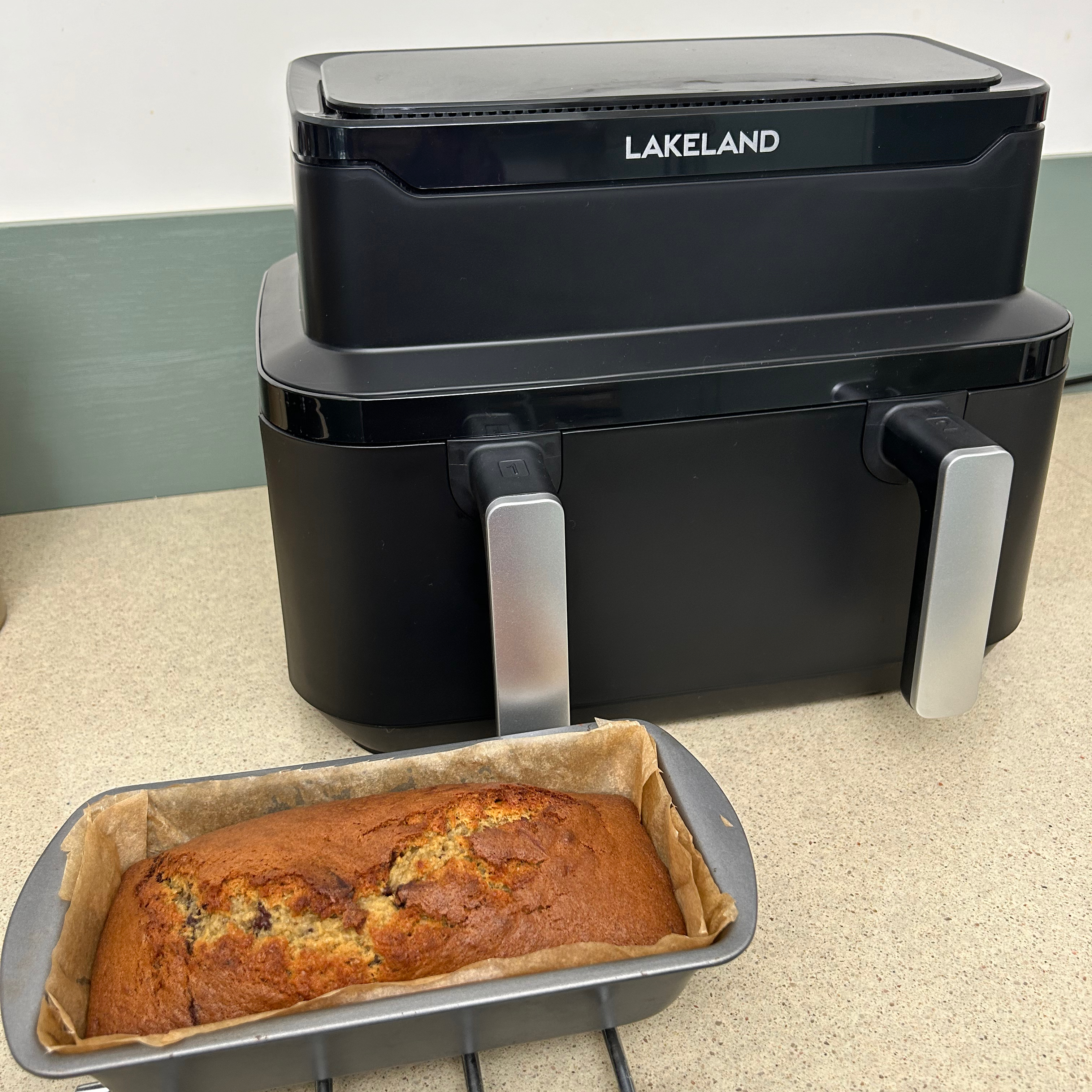
I make homemade granola every week and now always bake it in an air fryer. I adjusted the bake function to 165C and set the timer to 20 minutes. I had to open it up and stir the granola around several times during the bake, but because the drawer is so roomy, there’s plenty of space to stir it and ensure it cooks evenly. It was crunchy and golden at the end of the timer.
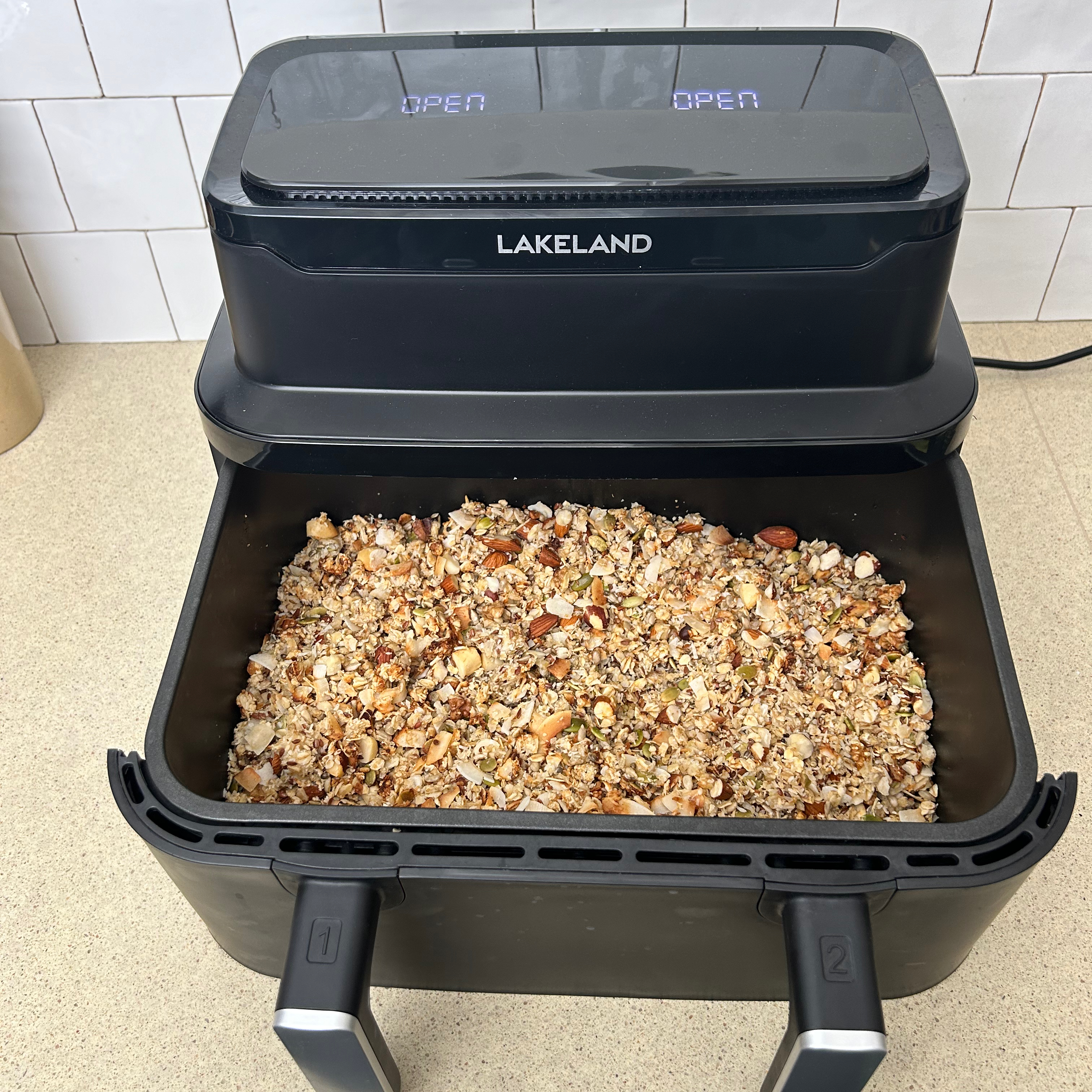
It wasn’t until writing up this review that I noticed a small line in the manual advising that you should preheat the air fryer for 3 minutes before adding food. Needless to say, I didn’t do this for any of the above foods, and they all still cooked well and in the expected times.
Out of interest, the drawer didn’t become any easier to remove or replace, even after I’d used it several times.
Cleaning
Usually I’m annoyed when an air fryer drawer can’t go in the dishwasher. And while it would be nice to have the option, the size of the drawer makes it impractical to wash in a dishwasher, it would just take up too much space.
The non-stick coating works well though and a bit of washing up liquid and warm water did the trick to remove all the grease and grime. Although, I noticed that unless I dried it immediately, it dried with unsightly water spots on the front of the drawer.
How does it compare to similar air fryers?
The Instant Vortex VersaZone has a similar price and capacity. Its angled control panel is easier to see, making it more user friendly. It doesn’t offer preset cooking modes for common foods, but instead has various cooking modes including roast, bake, and grill. The drawer is easier to remove and replace, plus it can go in the dishwasher.
With its 10.4litre capacity the Ninja Foodi FlexDrawer offers one of the biggest air fryer cooking zones around. It’s a top performing air fryer that’s great for families. But, it comes with a budget-busting price tag in excess of £250, which is a bitter pill to swallow.
Should you buy the Lakeland Adjustable Large Drawer air fryer?
In terms of how this air fryer performed, I couldn’t fault the results. Foods were cooked, crisped, and browned as well as in any other air fryer. But I had some issues with the design and usability.
It’s noisy, and the position of the control panel got on my nerves, because I couldn’t see the timer from across the kitchen. The drawer was stiff to remove and replace, and the divider doesn’t slot securely into position.
If you think the things that annoyed me wouldn’t bother you, then based on performance alone, it’s certainly up to the job. Plus, Lakeland has an excellent returns policy, so there’s peace of mind if you decide you’re not happy.







